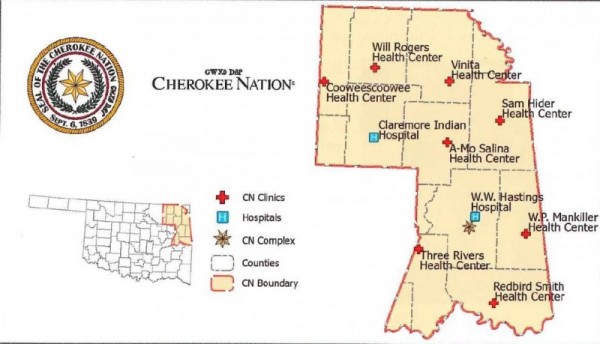
- Details
- By Chuck Hoskin Jr
Guest Opinion
In its recent ruling in McGirt v. Oklahoma, the United States Supreme Court affirmed what Native Americans in Oklahoma have always known and maintained: Our land is, and always has been, ours.
State and local governments spent decades assuming that our reservations, including the Cherokee Nation’s 7,000-square-mile reservation in northeast Oklahoma, no longer existed. However, the Supreme Court’s recent ruling very clearly explained that Congress never disestablished our reservations. Our reservations still exist. Our sovereign rights within those borders remain intact.
The ruling also represents new challenges for the Cherokee Nation to ensure there are no jurisdictional gaps affecting law enforcement and public safety in Oklahoma.
The Supreme Court ruling said that serious crimes committed within the Muscogee Creek reservation boundaries would no longer be under the jurisdiction of the state to prosecute, and those cases transferred to federal and tribal courts to prosecute. Because the Five Civilized Tribes historically share similar treaties, by extension, this ruling also applies to Cherokee Nation and violent crimes committed on Cherokee Nation reservation lands.
To prepare for the challenges, we recently established the Commission for the Protection of Cherokee Nation Sovereignty to make funding and resource recommendations and examine other related areas. Some of the brightest minds on the subject of sovereignty will be involved in the Commission, including Cherokee citizen and former United Nation’s Ambassador Keith Harper as well as people representing all branches of Cherokee Nation’s government.
The commission will analyze resource concerns, costs and necessary steps as the Cherokee Nation prepares to exercise expanded jurisdiction over crimes committed on our reservation lands.
We also rolled out the proposed Cherokee Nation Reservation, Judicial Expansion and Sovereignty Protection Act for consideration by the Council of the Cherokee Nation to facilitate additional federal funding for expanded staffing and resources and bring in judicial officers to help with workload increases. Twelve Council members are co-sponsoring the legislation and I anticipate broad support on final passage later this month. In addition, we are taking the necessary steps to expand our Marshal Service, Attorney General’s Office, detention and probation budgets, and tribal court system.
The commission will send me periodic reports and a final report by Dec. 1, so that the Cherokee Nation can start growing our courts, law enforcement and other areas related to the McGirt ruling. The legislation if approved by Council later this month will allow the Cherokee Nation to apply for funding and grants to expand.
I will also stay engaged in any congressional response to legislation, to ensure our tribal sovereignty is protected and that this historic ruling remains intact.
We are all too aware of the federal government’s history of failed promises to tribal nations. It is a pattern we have seen repeated too many times as the U.S. government has broken or simply ignored the promises it made to us through treaties. History has shown that failure to include tribal voices in formulating legislation or policy has too often led to devastating results.

Make no mistake, if we are not at that table, Congress will legislate without our voices. Anti-Indian groups, big energy corporations, and others have wasted no time in trying to steal away this historic Supreme Court victory. These forces are working overtime to divide tribal nations, create confusion, and deprive our citizens of their sovereign rights.
If I had not expected these forces would attack our sovereignty, I would be offended at how quickly they have done so. But tribal sovereignty is more than just a catchphrase, and it is more than a word that can be casually thrown around for political gain. The truth is, tribal sovereignty comes with rights and obligations, and we are fully prepared to demand our rights while fulfilling our obligations.
This court decision is the largest victory for Indian Country in our lifetime, but it also represents new challenges for the Cherokee Nation so we are preparing vigorously for what we anticipate is coming. I look forward to a detailed report from the commission in the coming weeks.
I am thankful to those who stand alongside our tribal nations as we work to uphold public safety, promote legal cooperation, secure our rights and protect the hard-fought recognition of our reservation boundaries. I want the McGirt v. Oklahoma ruling to be an enduring victory for Indian Country. This moment is too important for Cherokee Nation to sit by while others make decisions on our behalf.
Chuck Hoskin, Jr. is the principal chief of the Cherokee Nation.
More Stories Like This
What Michigan Owes Its Tribal NationsBuilding a Stronger Nation Through Service
Is Oil Worth More Than Water?
Tribal Economic Development Programs in the Federal Contracting Environment: What They Are, and What They Are Not
Why Redefining Public Health Degrees Would Harm Native and Rural Communities
Help us defend tribal sovereignty.
At Native News Online, our mission is rooted in telling the stories that strengthen sovereignty and uplift Indigenous voices — not just at year’s end, but every single day.
Because of your generosity last year, we were able to keep our reporters on the ground in tribal communities, at national gatherings and in the halls of Congress — covering the issues that matter most to Indian Country: sovereignty, culture, education, health and economic opportunity.
That support sustained us through a tough year in 2025. Now, as we look to the year ahead, we need your help right now to ensure warrior journalism remains strong — reporting that defends tribal sovereignty, amplifies Native truth, and holds power accountable.
 The stakes couldn't be higher. Your support keeps Native voices heard, Native stories told and Native sovereignty defended.
The stakes couldn't be higher. Your support keeps Native voices heard, Native stories told and Native sovereignty defended.
Stand with Warrior Journalism today.
Levi Rickert (Potawatomi), Editor & Publisher
